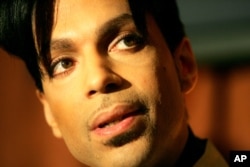The late pop star Prince was known in life as an artist fiercely protective of his intellectual property, but how much others may profit from his legacy, including a large body of unreleased songs, hinges on how astute he was in arranging for control of his music after death.
Questions about Prince's estate loomed on Friday, a day after his unexpected death at age 57. Sales of the iconic performer's albums surged, and platforms from satellite radio Sirius XM to MTV rushed to satisfy a sudden fascination with his music.
Some 230,000 albums and 1 million singles from Prince's catalog were sold in the United States alone on the day he died, according to BuzzAngle Music, which tracks daily music sales.
By comparison, folk-rock band the Lumineers sold 108,000 copies of its latest album, "Cleopatra," during the course of seven days as they topped Billboard's pop charts this week.
The long-term outlook for Prince's catalog depends on who ends up in charge of his estate and how much direction he provided before his death to govern his legacy, entertainment lawyers said.
Found dead of unknown causes at his home and studio compound in Minnesota, Prince is one of relatively few recording artists, even of his stature, believed to have possessed ownership of his master recordings and his own music publishing.
At stake are potential retail sales, licensing fees and royalties on music from more than 30 albums that have sold over 36 million copies in the United State alone since 1978, plus an extensive cache of unheard recordings said to be locked away in a vault.
The collection is believed to include an entire album he recorded with jazz trumpet great Miles Davis, said Owen Husney, who was Prince's first manager and teaches music business at the University of California, Los Angeles.
Husney said he would put the overall value of Prince's existing catalog at well over $500 million. That estimate factors in not just the potential for retail music sales but for rights to film, television, commercials and video games - which Prince in his lifetime rarely if ever licensed, Husney said.
The key unanswered question about the fate of Prince's intellectual property is whether he had a valid will or estate plan in place at the time of his death, lawyers said.
Twice divorced with no surviving children, he apparently lacked any immediately identifiable heirs, though Husney noted Prince has a sister, Tyka Nelson. His parents are both deceased.
"Hopefully, Prince executed a trust, and indicated his intentions both with respect to who his trustee would be and how he would want the estate to be disposed of," said celebrity probate attorney Dan Streisand, who has represented the estates of Marlon Brando, Barry White and Rodney Dangerfield.
Control From the Grave
Through instructions in a will to a trustee, the artist could posthumously restrict the granting of commercial licenses to his music, and thus, in effect, maintain control over his songs from the grave, lawyers said.
Absent a will, inheritance would be determined by a probate court, subject to the laws of succession in Prince's home state of Minnesota.
Prince was almost as well known for an unyielding defense of his artistic rights as he was for his music.
So assertive was he in maintaining creative control that during a bitter contract battle with Warner Bros. in the 1990s, he famously changed his name to an unpronounceable symbol and scrawled the word "slave" on his forehead in performances.
The dispute centered at least in part on Prince's desire to release his music more frequently than the label was willing.
Prince ultimately made peace with Warner, reaching a deal in 2014 to regain ownership of his master recordings in return for allowing the label to digitally remaster and reissue his back catalog, according to trade publication Variety and other media.
The artist had been similarly tenacious in limiting use of his material on YouTube and digital music streaming platforms such as Spotify and Rhapsody, although he made his entire catalog available on the artist-owned, premium subscription streaming service Tidal, launched by rapper Jay Z.
News of his death sparked an immediate bump in online sales of his music, with 15 of the top 20-selling albums, and 19 of the top 20-selling singles on iTunes belonging to Prince. Prince also accounted for 19 of Friday's top 20-selling records on Amazon.com
MTV replaced its regular programming with wall-to-wall Prince music videos and the film "Purple Rain" on Thursday, and Sirius XM created an all-Prince music channel to run through April 29.














